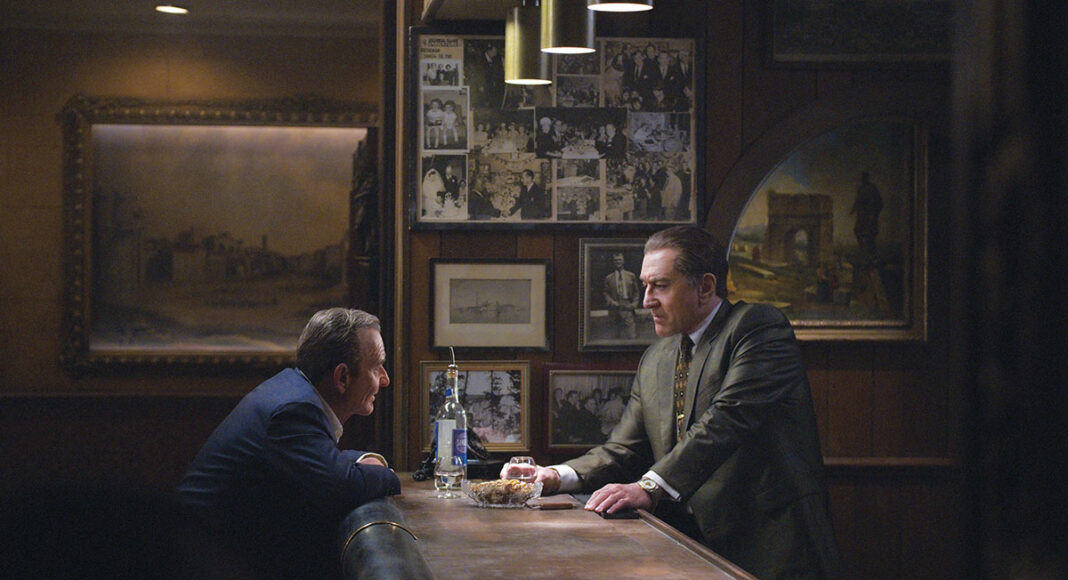Despite its budget, The Irishman is not a spectacle. Although, from the art direction to a terrific soundtrack, it’s almost as evocative in summing up mid-century America as Once Upon a Time in Hollywood.
Much of the budget went to the technical component of making Robert De Niro, Joe Pesci and Al Pacino into synthespians of themselves. Of course, one could grumble that Francis Coppola doubled old and young actors without the benefit of CGI in Godfather II, using old-media methods like sharp casting, juxtaposition and Nino Rota music strong enough to link present and past. But the effect works in The Irishman, as the actors get to be the people they used to be.
As for facial mobility, DeNiro doesn’t go in for it much here. His Frank “The Irishman” Sheeran is someone who’s been pretty much dead inside ever since his service in WWII.
Given what a rock fan Scorsese is, it’s appropriate to quote the lyrics of Pink Floyd’s “Free Four:” “The memory of a man in his old age/is the deeds of a young man in his prime/he shuffles ’round the gloom of his sick room/and talks to himself as he dies … ”
In Goodfellas, Scorsese’s camera glided around the backrooms of the Copacabana to capture the glitz on stage. Now it courses through the halls of an old folks’ home to zero in on Frank—one more old, gray man in a wheelchair trying to tell some unseen listener the story of a wedding he once attended in Detroit.
The anecdote expands into a three-sided tale of the old days, when Frank was a soldier, then a hapless Philly truck driver who moved sideways into delivering pilfered beef carcasses to a mob restaurant. There, he became first the employee and then the crony of a made man, Russell Bufalino (Joe Pesci); he got work as a button man who could never be an insider with the Sicilian gents because of his Irish blood. He’s a contractor. “I hear you paint houses,” is the greeting he gets—a sick joke explained with a gunshot and a splash of blood.
Frank is a Forest Gumpino, a witness to Secret History, a sturdy if wooden trellis that a half-century’s worth of florid, high-level crime trails around. The Irishman is the story of how the country was warped through the destruction of the most powerful labor leader in American history, Jimmy Hoffa (Al Pacino). It tells of the assassination of JFK, and how a familiar face or two from all this Mafia-CIA conniving came back for the Watergate burglary.
The Irishman’s understory is about the irony of slow decay. A man who had put so many bullets into so many heads still has the problem of any geezer: He falls and he can’t get up, and his daughter (Anna Paquin) won’t call him. Curious that a film with this much bitterness should be so savory, proof of Willie Sutton’s Law: “Crime pays, but it don’t pay much.”
It’s about pre-Reagan America, before the rich got super rich; a well-off crook like Bufalino may be collecting wads of cash all over the Midwest during the trip to Detroit, but all that money just buys a stay at a Howard Johnson’s or a trip to the bowling alley, the cold comforts of an ice cream sundae or a bowl of cereal.
Factually, the The Irishman is wobbly—fascinating and atmospheric as it is. But I hardly noticed the 3-and-a-half hours passing.
If anything, it could have used a little more length to explain the ins and outs of Jimmy Hoffa’s Nashville trial. Pacino, given a wig to make him look squareheaded like the man himself, becomes a driven, multi-faceted figure. He’s a warm man—doomed by his own integrity, and like so many old men, drives over the cliff because of his pride. Hoffa’s Trumpian style (calling RFK “Booby Kennedy” from the podium) gives us a mirror of our own age.
How much allure The Irishman will have for a younger audience is a puzzle. But this movie about the ashes of crime is Scorsese at his sharpest and most feeling.
The Irishman
R; 210 Mins.















Great Review. Speaking of Nino Rota’s glorious music, I swear I heard a bit from La Dolce Vita pop into The Irishman score for maybe 30s or so, but I’ve now forgotten what scene. I choose to believe it’s Scorsese giving a salute to Fellini who’s centenary is in January.